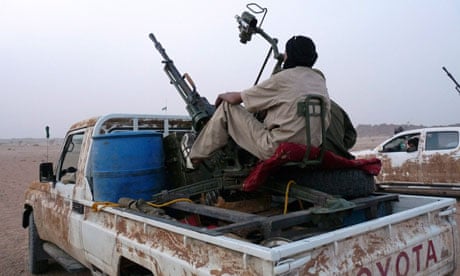Fears are growing for residents in northern Mali as separatist rebel fighters tighten their grip on key strategic towns, imposing strict Islamic rule.
Tuareg rebels, who have made massive advances in the region since a military coup toppled the country's civilian government, have now captured all the key towns in northern Mali, including Timbuktu, Kidal and Gao.
Residents spoke of their mounting distress, with women afraid to leave their homes and key food and water supplies dwindling.
"There is no army, no soldiers, no police. There is no one here to protect us," a source in Gao said. "We do not have enough to eat and our water is running out. The rebels will allow the women out to fetch water but other than that they have been told to stay in their homes."
"We are waiting for the army, or for international help. We are appealing for help or we will not survive."
Amnesty International said it had received reports of gunfire in the streets, looting and attacks on the hospital in Gao. "A woman was forced to give birth in the street in Gao as the hospital was being looted by armed men. Another patient died as medical care was withdrawn," a spokesperson for the human rights group said.
Pleas for outside intervention in northern Mali come amid political chaos in the capital, Bamako. Coup leaders who toppled the elected government of the president, Amadou Toumani Touré, enacted a new constitution for the country but have now repealed it in the face of growing international pressure.
The economic commission of west African states (Ecowas) has announced it will impose crippling sanctions on Mali after a deadline for setting a timetable for civilian rule was missed. The junta – now known as the National Committee for the Recovery of Democracy (CNRDR) – has not yet given its reaction to the move, but has made repeated calls for outside assistance to help defeat the Tuareg insurgency.
The CNRDR came to power last month claiming that dissatisfaction with the government's handling of the security crisis in northern Mali was its most significant motive for seizing power. "The situation in the north of Mali accounts for 70% of the reason why we have acted," the coup leader, Captain Amadou Sanogo, told journalists, adding that broader complaints with the government were also factors.
The response to the coup from the international community has been complex. Despite the announcement of sanctions, supported by some foreign powers, there has also been sympathy for the junta.
A senior security official from the US department of state said she had some sympathy with the coup leaders following the inability of the civilian government to contain the security crisis in northern Mali.
"Certainly part of the dissatisfaction of the military was that they were under-resourced to deal with this threat in the north," said Eunice Reddick, director of the office of west African affairs. "We can certainly understand their predicament. And we understand that to deal with this threat, the military needs to be as strong as possible."
Ecowas has said it will push for talks with rebels, who have fought for decades to create an independent state of "Azawad" in the resource-rich Sahara.
Their efforts are likely to intensify after the seizure of Timbuktu – a Unesco world heritage site – on Sunday. Although the Tuareg rebels include a number of factions – ranging from the secularist National Movement for the Liberation of the Azawad to Ansar Dine, the Tuareg Islamist faction – there are fears that groups linked to al-Qaida in the Islamic Maghreb (AQIM) have a role in the latest advances.
AQIM has long been active around Timbuktu, kidnapping three foreigners and killing a fourth in an attack last November.
"The rebels in Gao are Islamists," the Guardian's source said. "But no one knows who is really in charge – we are afraid to even leave the house except for essentials and we don't know when those will run out completely."
Local fears were exacerbated by reports of an exodus of foreigners from the country. A source said – in a report that cannot be independently verified – that Tuareg rebels in northern strongholds were rounding up foreigners and taking them to the airport.
The French government has advised its estimated 5,000 citizens in Mali to leave the country.









